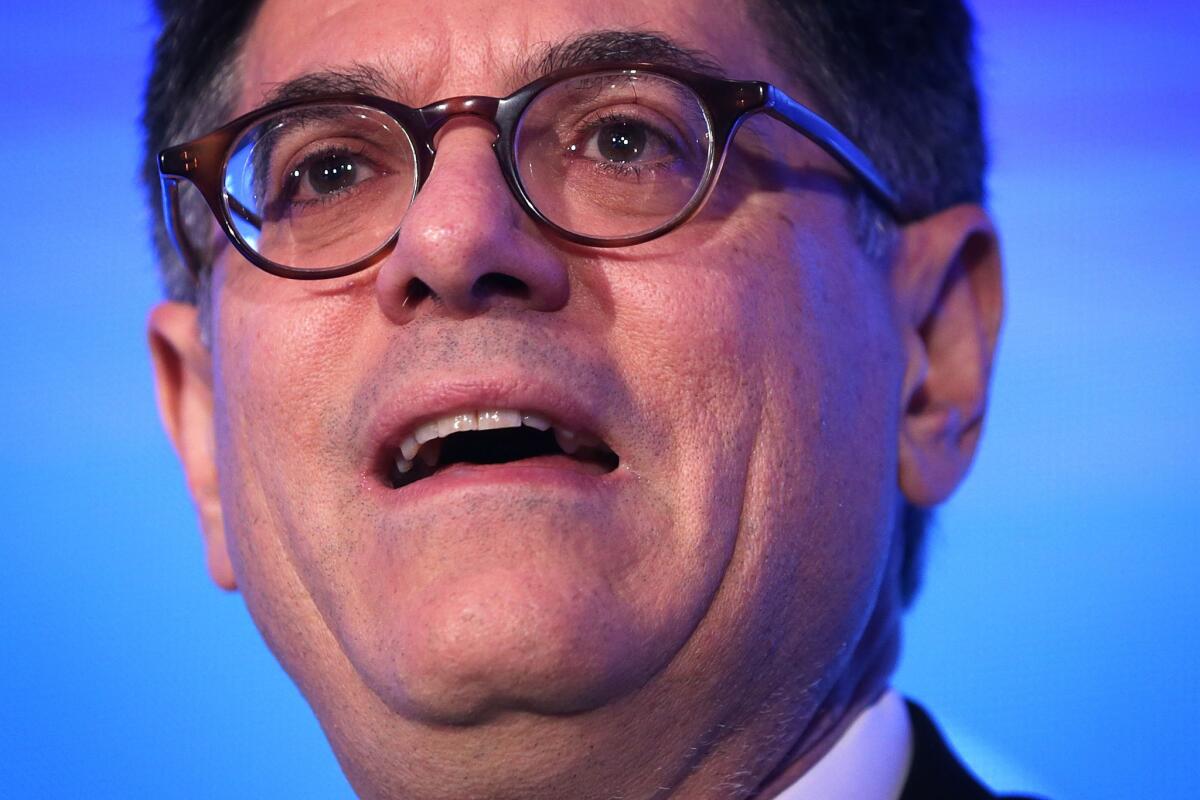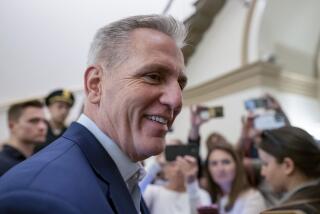As debt limit deadline nears, Lew worries about ‘terrible’ accident

Treasury Secretary Jacob J. Lew speaks during a discussion at the Financial Services Roundtable’s fall executive conference in Washington on Oct. 2.
- Share via
Reporting from Washington — Treasury Secretary Jacob J. Lew tried to increase pressure on lawmakers to raise the nation’s debt limit before a Nov. 3 deadline, warning that he feared an accidental federal government default if they wait too long.
“I worry every time we hit this that sometime there would be an accident, and that would be terrible,” he told CNBC-TV in an interview Monday.
Lew wrote to congressional leaders last week that the Treasury Department would run out of borrowing authority on Nov. 3 -- two days earlier than a previous estimate -- unless the $18.1-trillion debt limit is raised.
See the most-read stories this hour >>
At that point, he said, the Treasury will have about $30 billion in cash and will have to use that and the daily inflow of revenue to pay a host of major bills, including Social Security payments, federal salaries and interest on the debt.
“Just think about it, we have a government of the United States, a $4-trillion-a-year enterprise, where swings of a few billion dollars can determine whether or not you have enough cash to pay your bills,” Lew said.
“It’s ridiculous,” he said. “The debt limit needs to be raised.”
Republican congressional leaders have said they want to avoid a federal government default, but many conservatives want spending cuts in exchange for raising the debt limit.
Obama administration officials have refused to negotiate, arguing that Congress has a responsibility to raise the limit to pay for spending that it already has authorized.
Lew said the recent turmoil among House Republicans, which led Speaker John A. Boehner (R-Ohio) to announce he was stepping down, has complicated the issue as the deadline approaches.
“I believe that all the congressional leaders understand that they need to do this,” Lew said. “I think they’re in a very uncertain environment right now in Congress and they don’t have a lot of time.”
Chris Krueger, a Washington policy analyst at financial services firm Guggenheim Partners, said in an report to clients Monday that there was a “40% probability for some kind of accident that would keep Congress from raising the debt ceiling in time due to brinkmanship, procrastination or political gridlock.”
SIGN UP for the free California Inc. business newsletter >>
“We believe the debt ceiling will be raised in November, but we are basing that on nothing more than blind faith and would remind investors who shrug at another debt ceiling ‘boy cried wolf’ charade that, at the end of the book, the wolf eats the boy,” he said.
A 2011 standoff over the debt limit, which was raised at the last minute, spurred Standard & Poor’s to downgrade the nation’s AAA credit rating for the first time. Another showdown two years later -- again resolved before a default -- caused investors to avoid buying some government bonds and led to higher government borrowing costs.
The brinkmanship over the issue in recent years has sparked calls from the Government Accountability Office and others for Congress to change the way it handles the debt limit to avoid future crises.
The nation technically hit the debt limit last March, but Treasury officials have been using so-called extraordinary measures since then to juggle government finances and continue borrowing.
Those measures will be exhausted on Nov. 3, starting the clock ticking on a potential default, Lew said.
The Bipartisan Policy Center think tank has estimated that the Treasury would not be able to pay all of its bills sometime between Nov. 10 and Nov. 19.
But Lew said it’s difficult to estimate the exact date a default could happen, which is why Congress shouldn’t delay.
“Anytime you wait until the last possible minute, you’re inviting a risk, and this is not a last minute that we can know with absolute certainty,” he said.
Follow @JimPuzzanghera on Twitter
ALSO
Michael Hiltzik: A debt limit fight -- again?
Chinese cyberattacks on U.S. companies continue, report says
‘Larrymania’ reality star is now in real trouble -- in small-town South Carolina
More to Read
Inside the business of entertainment
The Wide Shot brings you news, analysis and insights on everything from streaming wars to production — and what it all means for the future.
You may occasionally receive promotional content from the Los Angeles Times.











